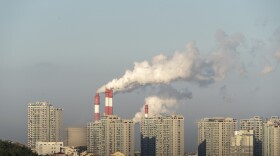Julia Paramo and Kidus Girma are still recovering after surviving with nothing but water and vitamins for two weeks.
The North Texas activists were among a handful of climate activists who went on a hunger strike between Oct. 20-Nov. 2 to demand Congress follow through on pledges outlined in President Biden’s Build Back Better legislation.
The bill is an ambitious plan that includes one of the largest federal initiatives to fight climate change, create millions of jobs, and address racial inequity issues.
Paramo and Girma belong to the Sunrise Movement in Dallas. They said they were inspired to get involved after living through the winter storm that crippled Texas last February. They went to the nation’s capital at the beginning of their hunger strike to demonstrate in front of the White House.
“We were very desperate to do something that matched kind of like the importance of passing climate in this bill, like, you know, we don't feel like we have a lot of options left,” Paramo said.
Girma called the February winter storm “a moment where our government didn’t need to fail and if had planned appropriately wouldn't have failed, but did catastrophically fail.”
Just days after they ended their hunger strike, Paramo said she’s still getting used to eating. Girma said he ate pizza for the first time since the strike ended, but he still gets fatigued after a 12-minute bike ride.
He said the reason behind the hunger strike was to highlight the moral conversation behind the climate crisis.
“For the first time in decades, possibly since… the Great Society in the 60s, might be the first time that we actively substantially center the lobbying of people versus profits or industry or corporations,” said Girma.
Although he and Paramo ended their strike due to health reasons, their efforts made national headlines.
They are also part of the group of activists who confronted Sen. Joe Manchin (D-W.Va) about his opposition to clean energy proposals in President Biden’s economic package. Following the actions, #MaseratiManchin became a trending topic on social media.
Paramo said she received mixed reactions from the public, with people criticizing that she and the other strikers were at the center of the movement.
“It just felt kind of like, bizarre to hear that, because I feel like anyone else who is affected by climate change… has climate trauma,” she said.
Girma and Paramo say after being in the spotlight for their hunger strike, they want to continue bringing attention to local issues in North Texas.
In September, seven Texas Democrats, including Rep. Marc Veasey, D-Fort Worth and Colin Allred, D-Dallas, sent a letter to Nancy Pelosi raising concerns over the Democratic party's plan to combat climate change and its impact on the energy industry.
Girma said Allred showed he was fighting for the oil and gas industry by signing the letter, so the group protested outside the representative’s house in September.
According to Allred spokesperson Joshua Stewart, Dallas police had to block the protesters from the representative’s home due to security concerns.
Stewart said Allred has always supported passage of the Build Back Better Act. Allred has shown public support for the bill on social media.
For too long the U.S. failed to meet the moment and address the climate crisis but the #BuildBackBetter Act changes that. It will make the single biggest climate investment in history, create millions of clean energy jobs and position us to lead the world. https://t.co/maGwvvPCtv
— Rep. Colin Allred (@RepColinAllred) November 1, 2021
Veasey’s office said the Fort Worth representative has also said he will vote for the bill once it comes to the floor.
“I think it's really important for us to keep putting pressure on people like Marc Veasey, Colin Allred, [and Eddie Bernice Johnson], to recognize that we're in the climate crisis and that it deeply impacts our area, like we saw back in February,” said Paramo.
Got a tip? Email Pablo Arauz Peña at parauzpena@kera.org.
KERA News is made possible through the generosity of our members. If you find this reporting valuable, consider making a tax-deductible gift today. Thank you.







